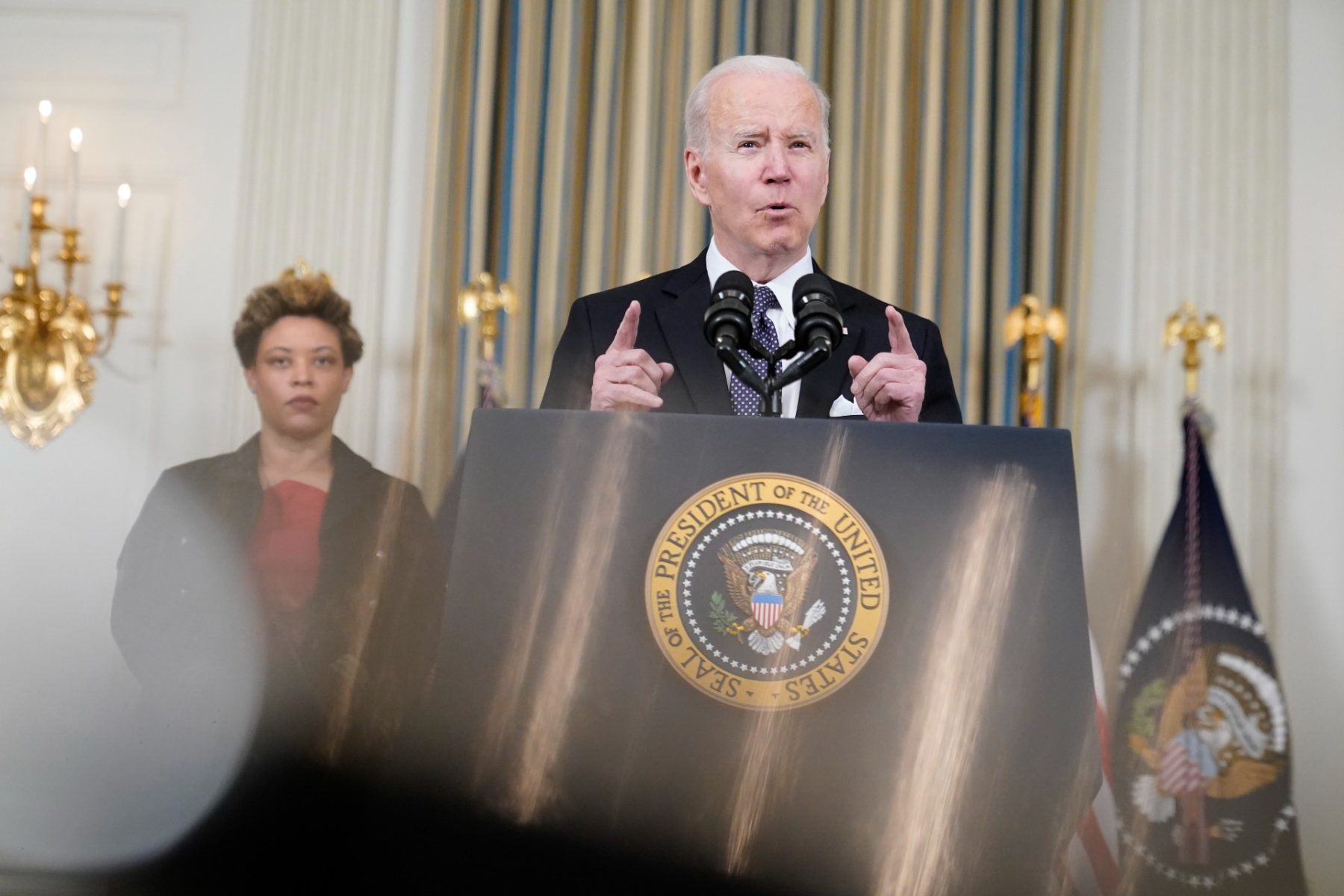
Yesterday, the Biden White House unveiled a budget request for Fiscal Year 2023 that continues the trend of sharply rising defense spending by proposing a record $813.3 billion in military spending—an increase of $31 billion, about four percent, over this year.
The bulk of that amount is composed of $773 billion for the Pentagon, with new investments proposed to be made in the nuclear weapons triad and in building a new long-range bomber. If passed, President Biden will have increased military spending by nearly 10% over the levels enacted in 2021 following Trump’s final budget request.
The entire discretionary budget request was for $1.64 trillion, meaning that the White House would once again like to have about half of the funding that Congress will authorize and appropriate go to the military. Counting mandatory spending, Biden’s total FY23 request is for $5.8 trillion—a tick down from spending in 2022, which included coronavirus pandemic recovery.
The war in Ukraine looms over the budget announcement. The White House said it was “calling for continued investment to forcefully respond to Putin’s aggression against Ukraine,” and The New York Times led its writeup of the proposal with a mention of Russia’s invasion.
The Pentagon has also been highlighting what it calls the “pacing challenge” of China as a reason to keep spending levels high. Several progressive national security experts have put out op-eds that underscore the financial interests of for-profit weapons makers and defense contractors in keeping the defense budget bloated. The op-eds argue that the war in Ukraine should not be treated as the justification to pad an already-gigantic defense budget, when only a fraction of that amount—some $17 billion this year—goes toward diplomacy.
Yesterday, a virtual panel of budget experts and Pentagon watchdogs addressed the latest budget blueprint—as the nonprofit organization National Priorities Project puts it, “The U.S. military budget is already more than the next 11 countries combined, 12 times more than Russia’s, and higher than at the peak of the Vietnam War or the Cold War.”
[Get the free Brick House newsletter.]
Budget expert Laicie Heeley with the nonpartisan think tank Stimson Center mentioned that Trump’s defense budget for FY 2023 would have requested about $28 billion less. “The war in Ukraine is driving and will continue to drive a lot of this train toward large increases in Congress,” Heeley said, with 40 Republican lawmakers, led by Rep. Mike Rogers (R-Ala.) and Sen. Jim Inhofe (R-Okla.), calling for an additional 5% across-the-board defense spending hike. Last year House lawmakers added and approved $25 billion to Biden’s defense request.
“The discretionary budget needs to be balanced on our nation’s needs,” said Lindsay Koshgarian, program director of the National Priorities Project. She emphasized that national security spending, including vast enterprises like the Department of Homeland Security and Veterans Affairs, makes up about two-thirds of the discretionary budget. “We have about one million Americans who have died of Covid, Congress just rejected $15 billion in Covid funding in the omnibus, and yet the increase in the [national defense] budget line is $31 billion,” Koshgarian said.
“The first thing that strikes me about this budget, with all the talk about Ukraine and a new cold war, is that this budget is more than $100 billion higher than it was at the peak of the Cold War, when adjusted for inflation,” said longtime defense analyst William Hartung.
Hartung pointed to the approximately 700 lobbyists working for private defense contractors that spent $220 million in the last election cycle on federal lobbying, employing many lobbyists that previously worked in the government and have since traveled through the revolving door. “Admirals and generals who know how the buying system works at the Pentagon, this budget is going to be a bonanza for them,” Hartung said. He called the contractors’ practice of promoting military-related jobs spread across congressional districts a form of “jobs blackmail” for the legislators who approve and dole out the funding.
If Republican lawmakers in Congress succeed at boosting the spending authorization, Hartung wrote at the Quincy Institute for Responsible Statecraft, the defense figure could hit $875 billion. Members of the bipartisan Joint Strike Fighter Caucus leapt into action, calling on Biden to reconsider his request to trim the budget for the troubled F-35 fighter jets and restore an order for 94 planes. The caucus’ leaders have been among the top House recipients of campaign cash from the program’s prime contractor, Lockheed Martin.
Hartung also noted that “a lot of big companies make their money on R&D,” and that the large increases on the nuclear side include doubling spending on the B-21 nuclear bomber and increasing by a third spending on a General Dynamics-made submarine, with other investments sought in the Northrop Grumman ICBM program. “There are more than enough weapons,” Hartung said. “Spending more is a waste of money but could spur nuclear proliferation.”
Continuing to lead calls for defense spending reductions, Democratic Reps. Mark Pocan (Wis.) and Barbara Lee (Calif.) sent a letter earlier this month to Biden asking him to resist Pentagon budget increases, writing, “Diplomacy and international aid will suffer, as will our response to the largest threats currently facing the nation, the ongoing global pandemic and climate change.”
House Democratic lawmakers who for the past two years have voted against reductions to the Pentagon’s budget have received over three times as much in campaign contributions from the defense industry as those who voted for the measure, according to Sludge’s calculations.
For more muckraking, get the Sludge newsletter .
